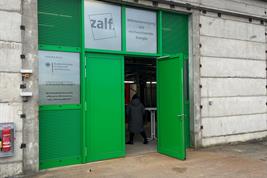31.01.2024

On Thursday, January 25, Martin Jank, ZALF's Administrative Director, hosted the official inauguration of a new woodchip heating system in Hall 51. According to Jank, the new heating system is "an important first building block for a secure, affordable and environmentally friendly energy supply" and one of the projects to increase ZALF's energy resilience.
The wood chip heating system is operated with wood residues (crown and weak wood) from the Müncheberg municipal forest, so that as few transport emissions as possible are generated. Compared to systems that run on oil or gas, this heating system is cheaper and more sustainable, as it relies on renewable and regionally available resources.
For the calculation of the emissions balance (Lit.: Emissions balance of renewable energy sources; UBA, Dec. 2023), we can now calculate only 23.6 g CO2,e /kWh (wood chips) incl. upstream chains etc. for the new heating system instead of 257 g CO2,e/kWh (gas) or 313 g CO2,e /kWh (oil), which were the two heating systems previously used by ZALF. This means that around 90 % of emissions can be saved, according to Bettina Schoch-Liebe, Sustainability Officer at ZALF.
The cost-effectiveness of the project, which was the starting point for the realignment of the heating supply at ZALF, is particularly pleasing. "Compared to our previous heating costs for gas and oil, the new system will have paid for itself in around 4 - 5 years, depending on price developments on the commodity markets. In other words, around a quarter of a million euros in additional costs will be avoided," says Jank.
The plant was put into operation in December 2023 and has been supplying the ZALF campus with heat ever since. At the official inauguration ceremony, the ZALF Administration thanked everyone who made the construction possible and was involved in it.
Martina Rahnenführer, Head of Facility Management, gave the facts about the conversion: "Two boilers with electrostatic precipitators, three 45,000-liter heat storage tanks and two moving floors for the wood chip supply were installed in Hall 51. The construction process took a total of seven months, with planning starting in November 2022. The investment costs for the ZALF were around 1.3 million euros, as the construction work was funded by BAFA."
During the inauguration ceremony, Martin Jank provided an insight into other planned projects that will make the ZALF campus more sustainable, such as the agri-PV system, heat supply for the greenhouse through waste heat recovery and connecting the guest house to the cheaper local heating network.
